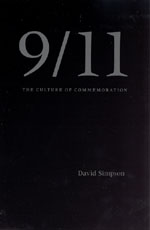Where are the ghosts of 9/11?
 David Simpson, author of 9/11: The Culture of Commemoration wonders, where are the ghosts?
David Simpson, author of 9/11: The Culture of Commemoration wonders, where are the ghosts?
Seven years after 9/11 one of the strangest things is that there are no ghosts. There never were. The photographs that appeared day after day in The New York Times seemed to me then flagrantly dishonorable in their very effort to commemorate. They left little to be haunted by as they reconstructed the lives of the dead as Disneyfied icons of optimistic upward mobility, dreams achieved, selfless happiness, and civic virtue amidst an energetic and responsive democracy. No one was cruel, unhappy, or disappointed, no one unappeased.
Ghosts call for appeasement and are symptomatic of unfinished business. Whether from a desire to be properly buried, to be forgiven, to punish, or simply to visit once again the living, to mourn with them, inform them or warn them, the ghost demands attention. It says, above all: I have come to trouble you, in death as I might have done in life, and to confront you what you cannot easily dismiss or understand. As we approach a critical election I fear that these ghosts will once again be prevented from haunting us in any profound way; that they will again be conjured away even as they are conjured up as a revenge motif by a deadly political game whose logic requires endless war and whose methods are the manufacture of a fear that is always of the ‘other’ and never of the uncanny that is all too at home in the homeland itself.
I’d like to believe that the heavy tread of the politicians toward brave little Georgia and the cross-border raids into Pakistan do not prefigure some October surprise that will once again exploit our September memories, but I remember how little we had of a critical and vigilant journalism during the prelude to the invasion of Iraq. Far too many on all sides have died to avenge the dead of 9/11. We have managed little or no concern about these deaths even when they are our own. Except for the immediately bereaved who have hardly been allowed to speak but are constantly spoken for, we have continued to be kept (do we keep ourselves?) from our own hauntings, our own Godzillas or jungles of screaming souls. We remain collectively all too untroubled by the dead of 9/11, all too confident of the way to go. There has been no new seriousness of the sort that 9/11 seemed to demand seven years ago. The rhetoric of trauma was everywhere in the months after 9/11, but it concealed the absence of trauma itself, of deep trauma’s imperative toward introversion and arrestation. We did not stop the clock for deep reflection. I fear that the next two months are not likely to produce any more complex emotions than the ones we have had thrust upon us for the last seven years.